
The Significance of Marketing Tools for Modern Businesses
| Key Takeaways for Marketing Tools |
|---|
| Marketing Tools Overview |
| – Diverse software and platforms |
| – Streamline, automate, enhance |
| – Valuable for all business sizes |
| Importance of Marketing Tools |
| – Competitive edge in the digital era |
| – Data-driven decision-making |
| Best Marketing Tools |
| – Email marketing, automation, social media, analytics, and more |
| Email Marketing Tools |
| – Building customer relationships |
| – Driving conversions |
| Marketing Automation Tools and AI writers |
| – Task automation |
| – Improved lead nurturing and conversion |
| Digital Marketing Tools |
| – SEO, content, paid advertising, and analytics |
| – Strong online presence |
| Social Media Marketing Tools |
| – Platform management |
| – Engaging with followers |
| Marketing Intelligence Tools |
| – Data-driven insights |
| – Informed decision-making |
| Maximizing Marketing Success |
| – Customer personas |
| – Data-driven strategies |
| – Collaboration and data security |
| Your Path to Marketing Excellence |
| – Identifying goals |
| – Choosing the right tools |
| – Mastering data analytics |
| – Staying informed |
| – Effective collaboration |
| – Testing and optimization |
| – Prioritizing data security |
| – Staying agile |
| – Measuring and iterating |
In today’s fast-paced and ever-evolving business landscape, marketing plays a pivotal role in helping businesses connect with their audience, streamline operations, and make data-driven decisions. Whether you’re a small business owner or a marketing professional looking to enhance your skills, understanding the importance of marketing tools is the first step towards achieving your goals.
Why Marketing Tools Matter
Marketing tools encompass a wide range of software and resources designed to simplify and enhance marketing efforts. They offer numerous benefits, such as:
- Targeted Audience Reach: These tools allow businesses to identify and reach their specific target audience with precision. This not only increases the likelihood of converting leads into customers but also saves resources by avoiding wasted efforts on irrelevant demographics.
- Data-Driven Decision-Making: In the digital age, data is king. Marketing tools provide valuable insights and analytics, enabling businesses to make informed decisions based on real-time data. This data-driven approach is essential for adapting to market changes and optimizing strategies.
- Efficiency and Productivity: Automation is a key feature, simplifying repetitive tasks and workflows. This boosts productivity and frees up time for strategic planning and creativity.
- Competitive Edge: Staying competitive in the market requires a deep understanding of industry trends and customer preferences. Marketing tools provide the necessary intelligence to stay ahead of the competition.
- Cost-Effective Solutions: Small businesses, in particular, can benefit from marketing tools as they offer cost-effective alternatives to traditional marketing methods. They allow for targeted campaigns within a limited budget.
Tools vs Services Cost Comparison
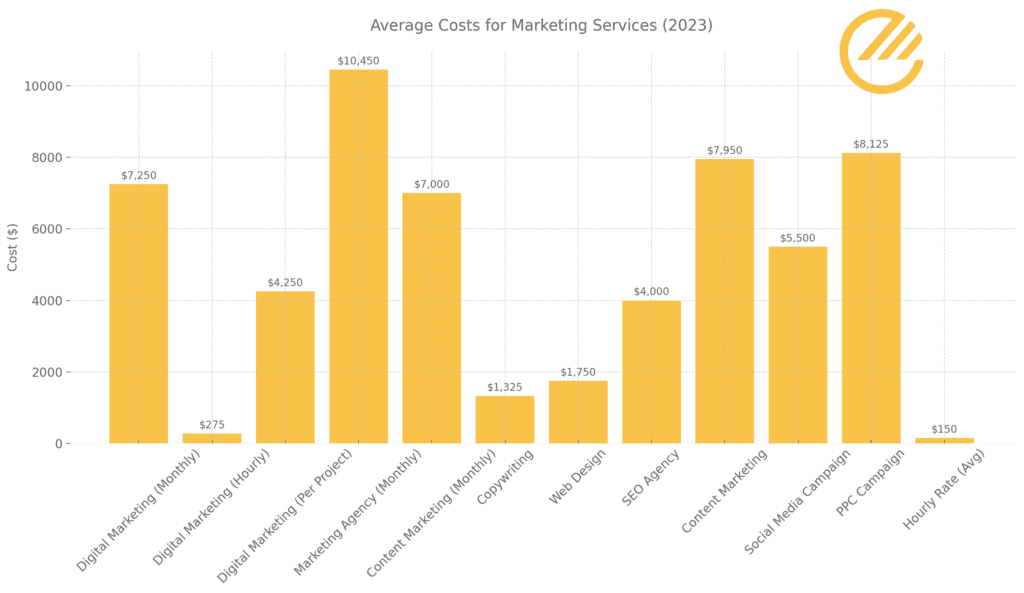
| Marketing Services | Average Monthly Cost (SMBs) | Average Hourly Rate | Average Per Project Cost |
|---|---|---|---|
| Digital Marketing Services | $2,500 – $12,000 | $50 – $500+ | $1,000 – $7,500 |
| Marketing Agency Costs | $900 – $20,000 (on average) | N/A | N/A |
| Content Marketing | $2,000 – $12,000 (SMBs) | N/A | N/A |
| Specific Digital Marketing Channels | N/A | N/A | N/A |
| Copywriting | $150 – $2,500 | $50 – $500+ | $1,000 – $7,500 |
| Web Design | $125 – $3,375 | $50 – $500+ | $1,000 – $7,500 |
| SEO Agency | $2,000 – $6,000 | $50 – $500+ | $1,000 – $7,500 |
| Content Marketing | $3,900 – $12,000 | $50 – $500+ | $1,000 – $7,500 |
| Social Media Campaign | $4,000 – $7,000 | $50 – $500+ | $1,000 – $7,500 |
| PPC Campaign | $6,250 – $10,000 | $50 – $500+ | $1,000 – $7,500 |
| Hourly Digital Marketing Rate | N/A | $50 – $500 (average $150) | N/A |
Source used: WebFx
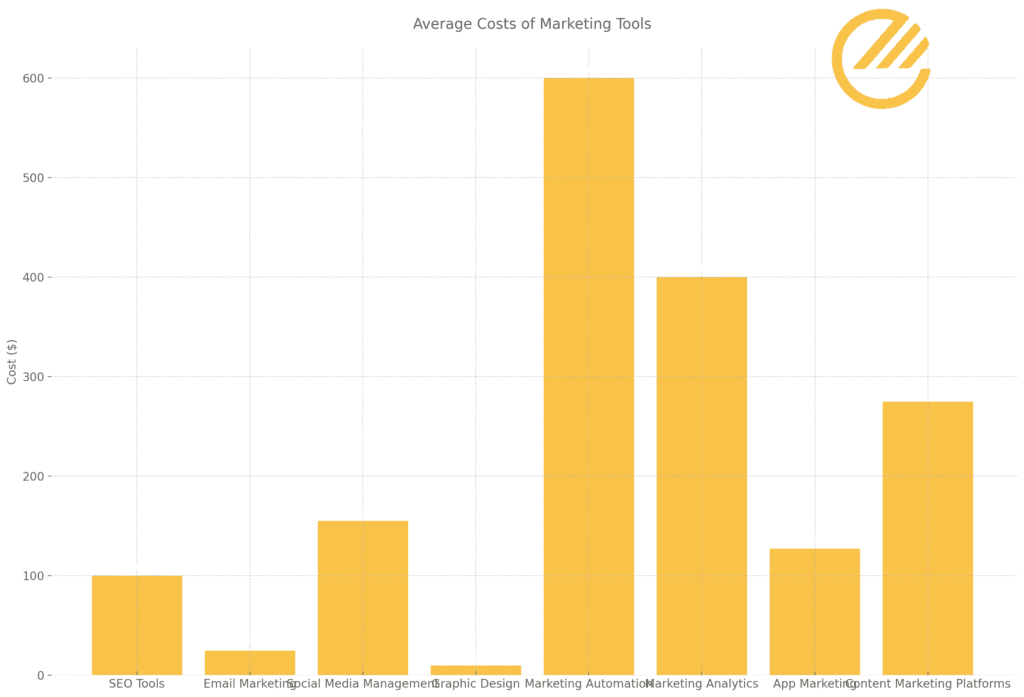
| Marketing Tools | Average Cost Range |
|---|---|
| SEO Tools | Free to around $200 per month |
| Email Marketing Tools | Free to around $50 per month |
| Social Media Management Tools | Around $10 to $300 per month |
| Graphic Design Tools | Free to around $20 per month |
| Marketing Automation | Around $200 to $1000 per month |
| Marketing Analytics | Around $300 to $500 per month |
| App Marketing | Highly variable based on scope and scale |
| Content Marketing Platforms | Around $50 to $500 per month |
When compared to tools, the average price hovers around $20-$1000 depending on plans and types of tools that you are using. This is still a massive cost reduction that allows you more insight and understanding of you market.
To view our picks of the best marketing tools for each category, check our guide how to Choose the Best Marketing Tools for Your Business!
How Marketing Has Evolved
The landscape of marketing has transformed significantly in recent years, driven by advancements in technology and shifts in consumer behavior. Here’s a brief overview of this evolution:
1. Transition to Digital
Traditional marketing, such as print ads and billboards, have given way to digital counterparts. Digital tools are now at the forefront of marketing strategies due to their cost-effectiveness, reach, and measurability. They include:
- Social Media Marketing : Platforms like Facebook, Instagram, and Twitter offer robust tools for creating and managing targeted advertising campaigns.
- Email Marketing: These tools streamline email campaigns, segmenting audiences and tracking performance metrics like open rates and click-through rates.
- Content Marketing: Content creation and management tools help businesses produce high-quality, relevant content for their target audience.

2. Automation and Personalization
Marketing automation tools have become increasingly sophisticated, allowing businesses to automate repetitive tasks, personalize communication, and nurture leads. Automation helps in:
- Lead Generation and Nurturing: Marketing automation platforms like HubSpot and Marketo can identify and engage potential customers at every stage of the buyer’s journey.
- Email Drip Campaigns: Automated email sequences are used to nurture leads with tailored content, increasing the chances of conversion.
- Personalized Recommendations: E-commerce businesses use AI-driven marketing tools to recommend products based on user behavior and preferences.
3. Data-Driven Decision-Making
The availability of vast amounts of data has revolutionized marketing. Advanced analytics tools for marketing enable businesses to:
- Track Performance: Google Analytics and similar tools provide detailed insights into website traffic, user behavior, and conversion rates.
- A/B Testing: Marketers can test different variations of campaigns to determine what resonates best with their audience.
- Predictive Analytics: Machine learning and AI are increasingly used for predictive modeling, helping businesses forecast future trends and customer behavior.
The impact of these developments extends beyond marketing departments; they influence the entire organization’s decision-making processes.
The Impact on Work Life and Productivity
As businesses integrate marketing tools into their operations, the effects on work life and productivity are profound:
- Streamlined Workflows: Streamline repetitive tasks, allowing marketing teams to focus on creative and strategic activities. This leads to improved job satisfaction and overall productivity.
- Remote Work Enablement: Many are cloud-based, facilitating remote work arrangements. This flexibility enhances work-life balance and expands talent pools for businesses.
- Data-Driven Culture: Encourages a data-driven culture within organizations. Teams are empowered to make decisions based on facts and insights rather than gut feelings, leading to more efficient and effective operations.
- Collaboration and Communication: Collaboration tools are often integrated into marketing platforms, fostering better communication among team members, even when working remotely.
- Scalability: Enable businesses to scale their efforts efficiently. Small businesses can compete with larger counterparts by leveraging cost-effective solutions and targeted marketing strategies.

Understanding the transformative impact of marketing tools on work life and productivity is key to harnessing their full potential. In the subsequent sections of this pillar page, we’ll delve deeper into various types of marketing tools, with a particular focus on those suitable for small businesses, email marketing, automation, and more. Whether you’re new to marketing or a seasoned professional, these insights will empower you to make informed decisions and excel in your marketing endeavors.
Exploring Marketing Tools for Small Businesses
In the ever-expanding realm of marketing, businesses of all sizes strive to make a significant impact. However, for small businesses with limited resources, the challenge can be especially daunting. This section focuses on the unique role that marketing tools play in empowering small businesses to compete effectively, optimize their marketing efforts, and achieve sustainable growth.
The Empowerment of Marketing Tools
Marketing instruments serve as invaluable assets for small businesses, providing solutions that address their specific challenges and level the playing field in the competitive marketing arena. Here’s how these tools empower small businesses:
1. Cost-Efficiency
These tools offer cost-effective alternatives to traditional advertising channels. They allow small businesses to maximize their return on investment (ROI) by reaching a wider audience without the exorbitant costs associated with print, TV, or radio advertising.
2. Automation and Efficiency
Automation is a game-changer for small businesses. Marketing tools automate routine tasks, such as scheduling social media posts, sending email campaigns, and tracking website analytics. This frees up valuable time and resources that can be redirected toward core business activities.
3. Targeted Marketing
Small businesses can’t afford to cast a wide net and hope for the best. Marketing tools enable precise audience targeting. For example, social media advertising platforms allow businesses to reach specific demographics, interests, and behaviors, ensuring that marketing efforts are focused and effective.
4. Analytics and Data-Driven Decisions
Data is a small business’s secret weapon. Marketing tools provide access to valuable data and analytics, enabling small businesses to measure campaign performance, understand customer behavior, and make informed decisions to optimize their strategies.
Key Areas of Impact
Marketing tools can make a significant impact in various key areas for small businesses:
1. Online Presence
Small businesses can establish a strong online presence through website optimization, social media engagement, and content marketing.
2. Customer Engagement
Tools for email marketing and social media management enable small businesses to engage with their customers, build relationships, and provide personalized experiences.
3. Lead Generation
Automation tools can nurture leads and guide them through the sales funnel, increasing conversion rates and revenue potential.
4. Competitive Edge
By leveraging these tools effectively, small businesses can compete confidently with larger counterparts. They can provide access to similar marketing capabilities on a smaller scale.
The Path to Sustainable Growth
For small businesses, growth isn’t just about surviving; it’s about thriving in a competitive marketplace. Marketing tools serve as a compass guiding small businesses toward sustainable growth by helping them:
- Maximize Efficiency: Automation streamlines marketing processes, allowing small businesses to do more with less.
- Enhance Targeting: Precise audience targeting ensures that marketing efforts are focused on potential customers most likely to convert.
- Measure and Adapt: Data-driven insights enable small businesses to make data-backed decisions and continually refine their marketing strategies.
- Build Brand Loyalty: Consistent engagement and personalized experiences foster customer loyalty, turning one-time buyers into repeat customers.
- Compete Effectively: Small businesses can stand toe-to-toe with larger competitors, reaching and engaging their target audience effectively.
In the dynamic world of marketing, small businesses are not just surviving; they’re thriving, thanks to the invaluable support of marketing tools. These tools empower them to optimize their marketing efforts, reach their audience, and achieve sustainable growth.
Types of Marketing Tools

Marketing tools are essential resources for businesses of all sizes, offering a wide range of capabilities to streamline marketing efforts and enhance performance. Let’s explore some key types of marketing tools that are crucial for achieving success in today’s digital landscape:
1. Social Media Marketing Tools
Effective social media management is vital for building brand presence and engaging with your target audience. Social media tools provide valuable features such as:
- Scheduling Posts: Tools like Buffer and Hootsuite allow you to plan and schedule social media posts in advance, ensuring a consistent online presence.
- Audience Analytics: Gain insights into your audience’s behavior and preferences through social media analytics tools. Monitor engagement metrics and adjust your strategy accordingly.
- Advertising: Platforms like Facebook Ads offer powerful advertising options, enabling you to target specific demographics and interests.
2. Email Marketing Tools
Email marketing remains a highly effective strategy for reaching and nurturing your audience. Email tools offer essential features including:
- List Management: Organize your email subscriber list and segment it based on various criteria, ensuring that your messages reach the right audience.
- Automation: Create automated email sequences to nurture leads, welcome new subscribers, or recover abandoned shopping carts for e-commerce businesses.
- Personalization: Tailor your email content to individual subscribers, enhancing engagement and conversion rates.
3. Content Marketing Tools
Content creation and management are vital for building an online presence and engaging with your audience. Content tools simplify the process with features like:
- Content Calendar: Plan your content strategy effectively using a content calendar tool. This ensures a consistent flow of content and helps you stay organized.
- Keyword Research: Tools like SEMrush and Ahrefs assist in finding relevant keywords to optimize your content for search engines.
- Content Creation: Tools like Canva and Grammarly aid in creating visually appealing and error-free content.
4. SEO Marketing Tools
Search engine optimization (SEO) is crucial for enhancing online visibility. SEO tools offer insights and tools for optimizing your website, including:
- Keyword Tracking: Monitor your website’s performance for specific keywords and phrases, identifying opportunities for improvement.
- Competitor Analysis: Understand your competitors’ strategies and adjust your SEO approach accordingly.
- Technical SEO: Identify and address technical issues that may affect your website’s search engine performance.
5. AI Writer Tools
Ai writing tools, such as NeuronWriter and ChatGPT, allow for quality content to be produced at a rate faster than ever before, within these tools they offer benefits such as:
- Competitor Analysis: Competitor analysis allows you to identify gaps in your own SEO strategy and discover opportunities to outperform your competition.
- Content Ideas: ontent ideas are the foundation of a successful content strategy. They help you create valuable, relevant, and shareable content that attracts and retains your audience’s attention.
- SEO Optimization: SEO optimization ensures that your website is easily discoverable by search engines, leading to higher rankings in search results.
6. Video Marketing Tools
Video content has become increasingly popular for engaging audiences. Video tools are essential for tasks such as:
- Video Editing: Tools like Adobe Premiere Rush and InVideo help create professional-quality videos without a steep learning curve.
- Video Hosting: Platforms like YouTube and Vimeo provide hosting solutions, making it easy to share videos on your website and social media.
- Analytics: Track video performance, engagement, and viewer demographics to refine your video marketing strategy.
7. Free Marketing Tools
For those with budget constraints, there are several free tools available, including:
- Google Analytics: A powerful tool for tracking website traffic and user behavior.
- MailChimp: A free email marketing platform for sending newsletters and automated campaigns.
- Canva: A user-friendly graphic design tool for creating visually appealing content.
Leveraging Marketing Tools for Success
Marketing tools empower businesses to optimize their strategies, engage their audiences effectively, and achieve measurable results. By choosing the right combination of tools and incorporating them into your marketing efforts, you can navigate the digital landscape with confidence and drive growth in your business.
Navigating the World of Email Marketing Tools
Email marketing remains a cornerstone of digital marketing strategies, delivering one of the highest returns on investment (ROI) among all marketing channels. In this section, we’ll explore the significance of email marketing tools, their essential features, and how they contribute to building effective email campaigns.
The Power of Email Marketing Tools
Email marketing tools are the backbone of successful email campaigns. They provide businesses with the means to reach their audience directly, engage with them, and drive conversions. Let’s dive into why email marketing tools are a must-have in your marketing toolkit:
1. Automation and Personalization
Email tools offer automation capabilities that streamline your email marketing efforts:
- Automated Campaigns: Schedule and send emails automatically based on triggers like sign-ups, birthdays, or specific actions taken by subscribers.
- Segmentation: Divide your email list into segments based on various criteria, allowing you to send highly targeted and relevant content.
- Personalization: Address subscribers by their name and deliver content tailored to their preferences, increasing engagement and conversion rates.
2. Analytics and Reporting
Measuring the effectiveness of your email campaigns is vital for making data-driven decisions. Email tools provide:
- Open and Click-Through Rates: Track how many recipients opened your email and clicked on links within it, helping you gauge engagement.
- Conversion Tracking: Identify which emails led to conversions, such as purchases or sign-ups, allowing you to refine your strategies.
- A/B Testing: Test different subject lines, content, and designs to determine what resonates best with your audience.
3. List Management and Growth
Building and managing your email list is fundamental to email marketing success. Email tools assist by:
- List Building Tools: Create sign-up forms and landing pages to capture email addresses and grow your subscriber list.
- List Cleaning: Remove inactive subscribers and maintain a clean and engaged list to improve deliverability rates.
- Compliance: Ensure your email marketing practices comply with regulations like the General Data Protection Regulation (GDPR) and the CAN-SPAM Act.
Must-Have Features in Email Marketing Tools

Not all email tools are created equal. When choosing one for your business, look for these essential features:
1. User-Friendly Interface
An intuitive interface simplifies the process of creating and sending emails, even for those without extensive technical knowledge.
2. Responsive Email Templates
Ensure that the tool provides responsive email templates that adapt to various devices, including desktops, tablets, and mobile phones.
3. List Segmentation
The ability to segment your email list based on subscriber behavior and demographics is crucial for delivering targeted content.
4. Automation Workflows
Look for tools that allow you to set up automated workflows for tasks like welcome emails, abandoned cart reminders, and lead nurturing.
5. A/B Testing
A/B testing features enable you to experiment with different elements of your emails to optimize performance.
6. Integration with Other Tools
Consider whether the email marketing tool can integrate with your existing marketing stack, including your website, CRM, and analytics tools.
How Email Marketing Tools Boost Productivity
Email marketing tools have a substantial impact on productivity:
- Time Efficiency: Automation streamlines the process of sending emails, saving you time that can be allocated to other critical tasks.
- Consistency: Scheduling emails in advance ensures that your subscribers receive content regularly, maintaining engagement.
- Data-Driven Insights: Analytics and reporting help you understand what works and what doesn’t, allowing you to refine your strategies efficiently.
- Scaling Campaigns: Email tools make it feasible to manage large subscriber lists and execute complex campaigns with ease.
Email Marketing Productivity Statistics
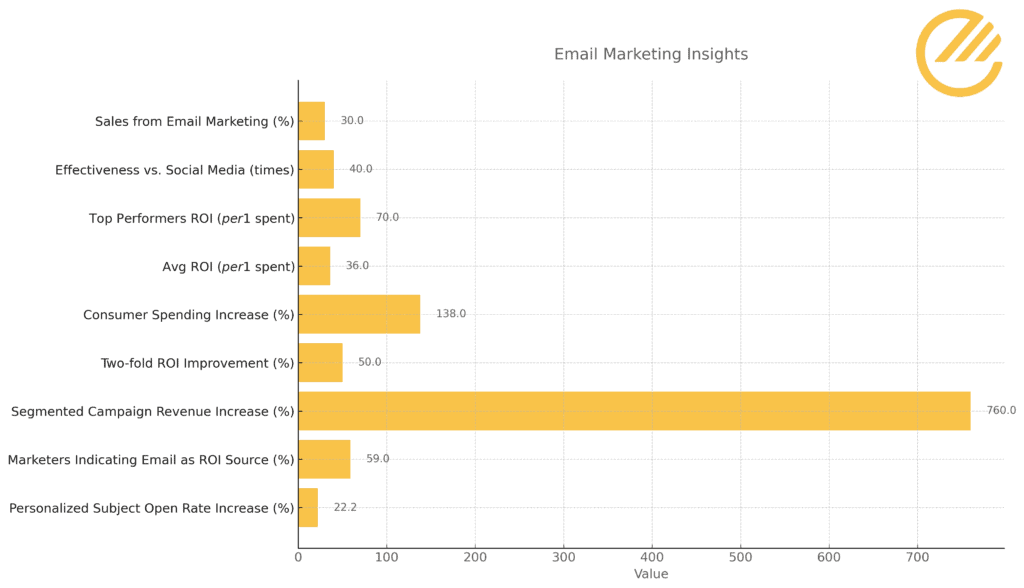
| Aspect | Insight/Data | Source |
|---|---|---|
| Personalization & Open Rates | 22.2% higher open rate with personalized subject lines | Pinpointe1 |
| Revenue Generation | Translation of leads into potential and actual revenue | HubSpot2 |
| Cost Efficiency | Lower cost per contact compared to other channels | Service Objects Blog3 |
| Improvement in Sales | 59% marketers cite email as biggest ROI source; 760% revenue increase in segmented campaigns | HubSpot Blog4 |
| High ROI | High return on investment with low initial costs | Mailchimp |
| Target Audience & Opportunity Identification | Well-defined target audience and identification of missed opportunities | Smart Data Collective6 |
| ROI Improvement | Two-fold improvement in email marketing campaigns’ ROI | Statista |
| Consumer Spending & ROI Metrics | 138% more spending when marketed via email; Average ROI of $36 for every $1 spent | Audience Point8 |
| Effectiveness vs Social Media | 40 times more effective than social media advertising | Audience Point8 |
| Email Marketing Metrics | Importance of tracking bounce rate, click-through rate, conversions, etc. | Audience Point8 |
| Sales Generation | 25-35% of sales should come from email marketing | Audience Poin |
Leveraging Email Marketing Tools for Success
To maximize the benefits of email tools, follow these best practices:
- Segment Your List: Divide your subscribers into meaningful segments based on demographics, behavior, and preferences.
- Personalize Content: Use personalization tokens to address subscribers by their name and tailor email content to their interests.
- Test and Optimize: Continuously test different elements of your emails and analyze the results to refine your campaigns.
- Comply with Regulations: Ensure that your email marketing practices comply with privacy regulations and provide clear options for subscribers to opt in or out.
- Monitor Deliverability: Keep an eye on email deliverability rates and maintain a clean subscriber list to avoid spam filters.
Email tools empower businesses to create highly targeted, personalized, and automated email campaigns that drive engagement and conversions. In the following sections of this pillar page, we’ll explore additional facets of these tools, including marketing automation tools and marketing intelligence tools, to equip you with a comprehensive understanding of how to harness the full potential of these tools in your marketing efforts.
Streamlining Marketing Efforts with Marketing Automation Tools
Marketing tools come in various forms, and one of the most powerful among them is email marketing. In this section, we’ll delve into the significance of these tools, focusing on marketing automation, and how they can revolutionize your marketing efforts.
1. Efficiency and Productivity

Automation eliminates repetitive manual tasks, freeing up your team’s time for more strategic and creative endeavors:
- Email Automation: Schedule and trigger emails automatically based on subscriber behavior, ensuring timely and relevant communication.
- Lead Scoring: Automatically assign scores to leads based on their interactions with your brand, allowing you to focus on high-potential prospects.
- Social Media Scheduling: Plan and schedule social media posts in advance, maintaining a consistent online presence.
2. Personalization at Scale
Marketing automation enables businesses to deliver personalized content and experiences to their audience, even at scale:
- Dynamic Content: Tailor email content and website experiences based on user behavior and preferences.
- Behavioral Triggers: Automatically send follow-up messages or offers based on how users interact with your website or emails.
- Recommendation Engines: Utilize machine learning algorithms to recommend products or content to individual users.
3. Lead Nurturing and Conversion
Marketing automation helps businesses nurture leads through the buyer’s journey, increasing the likelihood of conversion:
- Drip Campaigns: Set up automated email sequences that guide leads through the decision-making process.
- Automated Follow-Ups: Trigger emails or notifications when leads take specific actions, such as adding items to a cart or requesting a quote.
- Lead Scoring and Qualification: Identify the most promising leads for your sales team to prioritize.
Key Features to Look for in Marketing Automation
Choosing the right marketing automation tool is crucial for your success. Here are some key features to consider:
1. Ease of Use
A user-friendly interface ensures that your team can quickly adopt and utilize the automation tool effectively.
2. Multi-Channel Capabilities
Ensure that the tool can automate marketing efforts across various channels, including email, social media, and SMS.
3. Lead Tracking and Scoring
Effective lead management is vital. Look for tools that offer lead tracking and scoring features.
4. Personalization Options
The ability to create highly personalized content and experiences is a must-have feature.
5. Integration with Other Tools
Consider whether the automation tool can seamlessly integrate with your CRM, email marketing platform, and other tools.
Enhancing Work-Life Balance with Automation
Marketing automation not only improve efficiency but also contribute to a better work-life balance:
- Reduced Stress: Automation handles routine tasks, reducing the stress associated with manual work and tight deadlines.
- Flexible Scheduling: Schedule campaigns and posts in advance, allowing your team to maintain a consistent online presence without working around the clock.
- Data-Driven Decision-Making: Automation provides valuable data and insights, empowering your team to make informed decisions with confidence.
- Improved Collaboration: Collaboration features within automation tools foster better teamwork and communication, even in remote work settings.
Achieving Marketing Excellence with Automation
To excel in marketing with automation, consider these best practices:
- Understand Your Audience: Use automation to gather and analyze data about your audience’s preferences and behaviors.
- Segment Effectively: Segment your audience based on relevant criteria to deliver tailored content and experiences.
- Map the Customer Journey: Create automation workflows that align with the customer’s journey, from awareness to conversion and beyond.
- Regularly Review and Optimize: Continuously assess the performance of your automated campaigns and make necessary adjustments for improvement.
- Stay Updated: Keep up with the latest trends and developments in marketing automation to leverage new features and capabilities.
Marketing automation tools empower businesses to streamline their efforts, enhance productivity, and deliver personalized experiences to their audience. In the following sections of this pillar page, we’ll explore marketing intelligence tools, which provide valuable insights and data-driven strategies, to complete your understanding of the comprehensive world of marketing tools.
AI Writing Tools
In the ever-evolving landscape of writing and content creation, artificial intelligence (AI) is playing an increasingly vital role. AI writing tools have emerged as indispensable companions for writers across various domains, offering a wealth of features and benefits. In this section, we’ll delve into the world of AI writing tools, exploring their types, standout features, and the advantages they bring to writers. Additionally, we’ll provide valuable tips on how to effectively harness the power of these tools in your writing endeavors.
Percentage of marketers that use AI writing tools:
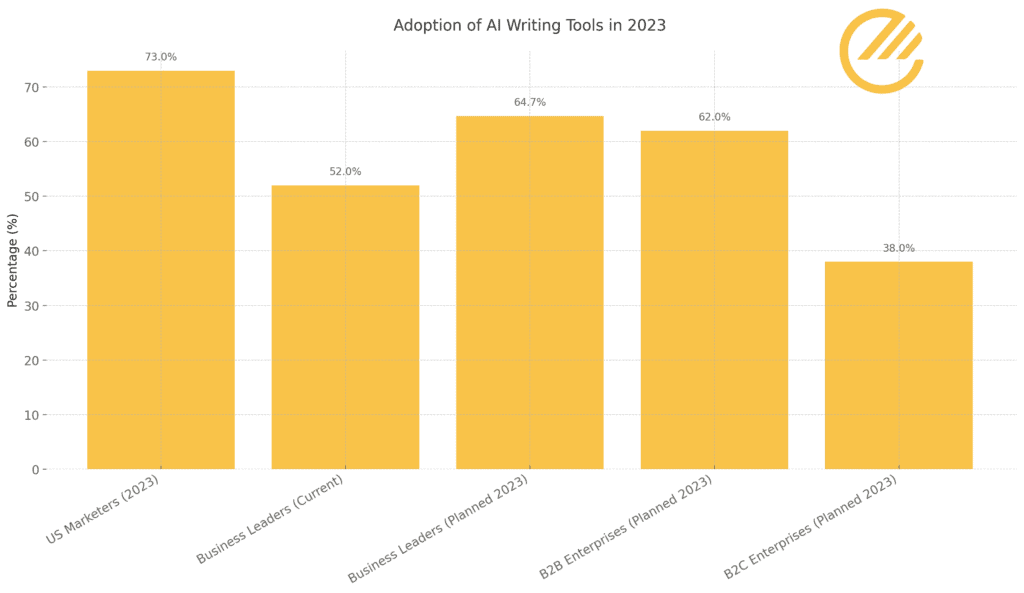
| Aspect | Description | Source(s) |
|---|---|---|
| General Usage | 73% of US marketers used generative AI tools in 2023. | Statista |
| Business Adoption | 52% were using AI content generation tools, with 64.7% planning to use them in 2023. 62% of B2B and 38% of B2C businesses also plan to use these tools in 2023. | Siege Media |
| Industry Reports | Various reports collected data from marketers on AI usage in marketing, without granular data on AI writing. | Marketing AI Institute, Influencer Marketing Hub |
I. Types of AI Writing Tools
1. Text Generation Tools
AI-driven text generation tools are the front-runners in the AI writing toolkit. These tools use advanced natural language processing models like GPT-3 and GPT-4 to generate human-like text based on provided prompts. They have found applications in content creation, chatbots, and even creative writing.
2. Grammar and Style Checkers
Grammar and style checkers, such as Grammarly and ProWritingAid, employ AI algorithms to help writers improve their writing. They identify and correct grammar mistakes, punctuation errors, and suggest improvements to enhance the overall style and readability of your content.
3. Content Ideation and Topic Generators
Struggling to come up with fresh content ideas? AI-powered content ideation tools like Portent’s Content Idea Generator can be a writer’s best friend. They assist in brainstorming ideas and generating engaging content topics, saving you precious time in the ideation phase.
Please keep in mind that paid plans usually include all three styles!
II. Features of AI Writing Tools
1. Auto-suggest and Auto-complete
AI writing tools excel in offering intelligent auto-suggestions and auto-completions. As you write, they anticipate what comes next, providing suggestions for sentence completion or generating new ideas when you’re stuck.
2. Grammar and Spell Check
No more agonizing over grammar and spelling mistakes. AI tools meticulously scan your content, flagging errors and offering suggestions for corrections. This ensures that your writing is polished and error-free.
3. Content Optimization
AI helps writers optimize content for search engines and readability. It suggests improvements in keyword usage, structure, and formatting to ensure that your content ranks well and engages readers effectively.
4. Language Translation and Multilingual Support
AI writing tools break language barriers by offering translation capabilities. They can translate your content into multiple languages, expanding your audience reach and global impact.
5. Customization and Personalization
AI tools allow you to customize suggestions to match your unique writing style. This personalization ensures that the AI becomes an extension of your creative process rather than a one-size-fits-all solution.
III. Benefits of Using AI Writing Tools
1. Time Efficiency
One of the most significant advantages of AI writing tools is their ability to save time. They automate repetitive tasks like proofreading and content generation, allowing you to focus on more creative aspects of writing.
2. Improved Quality
AI enhances the overall quality of your content. By catching grammar mistakes and suggesting improvements, it ensures that your writing is of the highest caliber.
3. Enhanced Creativity
AI-generated prompts can spark your creativity and provide fresh perspectives on your writing. They can help you break through writer’s block and explore new ideas.
4. Accessibility
AI writing tools are accessible to writers of all skill levels. Whether you’re a seasoned professional or a novice, these tools can be tailored to meet your specific needs and level of expertise.
IV. Considerations and Limitations

1. Accuracy and Reliability
While AI writing tools are powerful, they may not always produce accurate results. It’s essential to review and verify the content they generate, especially for critical or fact-based writing.
2. Privacy and Data Security
When using AI tools, consider data privacy and security. Ensure that the platform you choose adheres to strict privacy standards and safeguards your sensitive information.
3. Cost and Subscription Models
AI writing tools often come with subscription models or pricing tiers. It’s vital to assess the cost and choose a tool that aligns with your budget and writing requirements.
4. Human Touch vs. AI
Maintaining a balance between AI assistance and preserving your unique human touch in writing is crucial. Use AI tools as aids rather than replacements for your creative input.
V. Tips for Effective Use
1. Choose the Right Tool
Select an AI writing tool that aligns with your specific writing needs. Some tools are better suited for technical writing, while others excel in creative content generation.
| Jasper |
| Copy.ai |
| Writesonic |
| Sudowrite |
2. Review and Edit
While AI can enhance your writing, it’s essential to review and edit the content it generates. This ensures that the final output is polished and aligns with your voice and message. Add some human voice to it and make sure to proof read!
Unleashing the Power of Marketing Intelligence Tools for Enhanced Marketing
In an era where data is king, marketing intelligence is an indispensable for businesses looking to make informed decisions, optimize strategies, and outperform the competition. In this section, we’ll delve into the world of marketing tools with a specific focus on marketing intelligence, their significance, and how they provide invaluable insights to elevate your marketing success.

The Crucial Role of Marketing Tools
Marketing intelligence empowers businesses with data-driven insights into customer behavior, market trends, and campaign performance. Here’s why they are vital in today’s dynamic marketing landscape:
1. Data-Driven Decision-Making
Marketing intelligence gathers, analyzes, and presents data to support data-driven decision-making:
- Customer Insights: Gain a deeper understanding of your audience by analyzing demographics, preferences, and behaviors.
- Competitor Analysis: Stay ahead of the competition by monitoring and analyzing competitors’ strategies and performance.
- Market Trends: Adapt your marketing strategies to evolving industry trends and consumer preferences.
2. Optimizing Marketing Campaigns
Marketing intelligence offers actionable insights to enhance the effectiveness of your marketing campaigns:
- Real-Time Performance Tracking: Monitor campaign performance in real-time, enabling quick adjustments for optimal results.
- ROI Analysis: Measure the return on investment for each marketing channel and campaign, allowing resource allocation with precision.
- Attribution Modeling: Understand the impact of various touchpoints on conversions, ensuring proper credit allocation.
Key Features of Effective Marketing Intelligence
When selecting marketing intelligence services, consider these essential features:
1. Advanced Data Visualization
Tools with intuitive data visualization capabilities simplify complex data interpretation and facilitate effective communication of insights.
2. Comprehensive Competitor Analysis
Choose tools that provide in-depth competitor analysis, helping you identify strengths, weaknesses, and growth opportunities in the market.
3. Real-Time Monitoring and Alerts
Ensure the capability for real-time data monitoring and immediate alerts, allowing agile responses to changing market conditions and campaign performance.
4. Customized Reporting
Opt for tools that enable the creation of customized reports tailored to specific needs and key performance indicators (KPIs).

Leveraging Data for Marketing Excellence
Marketing intelligence has the potential to transform your marketing efforts. Here’s how to harness the power of data for marketing success:
- Customer Persona Development: Utilize customer insights to craft detailed buyer personas, enabling highly targeted and effective marketing.
- Competitive Benchmarking: Regularly analyze competitors’ strategies and adapt your own to gain a competitive edge in the market.
- Performance Optimization: Continuously assess campaign performance data to fine-tune strategies and allocate resources effectively.
- Data-Driven Content Creation: Develop content based on data-driven insights to resonate with your audience and address their specific needs and pain points.
- Predictive Analytics Utilization: Leverage predictive analytics to forecast trends and customer behavior, guiding your long-term marketing strategies.
Achieving Marketing Excellence with Data
To excel in marketing with the support of marketing intelligence, consider these best practices:
- Data Quality Assurance: Maintain data accuracy and reliability through regular data audits and cleansing procedures.
- Cross-Channel Data Integration: Seamlessly integrate data from various marketing channels for a holistic view of your marketing efforts.
- Data Security Measures: Implement robust data security protocols to safeguard sensitive customer information.
- Continuous Learning and Adaptation: Stay updated on the latest advancements in marketing intelligence and data analytics to remain agile and competitive.
- Collaboration and Team Synergy: Foster collaboration between marketing and data analytics teams to harness data effectively and drive marketing success.
Embrace the Power of Marketing Intelligence
Marketing intelligence tools empower businesses with the knowledge and insights needed to make informed decisions, optimize marketing strategies, and achieve marketing excellence. In the final section of this pillar page, we’ll provide a comprehensive summary of the key takeaways and actionable steps to harness the full potential of marketing tools in your organization’s marketing endeavors.
Key Takeaways for Elevating Your Marketing Strategy
1. Understanding the Role of Marketing Tools
- Marketing tools encompass a wide array of software and platforms designed to streamline, automate, and enhance various aspects of marketing.
- These tools are invaluable for businesses of all sizes, enabling them to optimize their efforts, reach their target audience effectively, and drive growth.
2. The Significance of Marketing Tools
- Marketing tools are essential for staying competitive in today’s digital landscape, where consumers expect personalized experiences and seamless interactions with brands.
- They facilitate data-driven decision-making, enhance efficiency, and enable businesses to adapt to changing market conditions.
3. Exploring a Diverse Array of Marketing Tools
- There is a diverse selection of marketing tools available, ranging from email marketing and automation platforms to social media management and analytics.
- Choosing the right tools for your specific needs is crucial for achieving marketing success.
4. Tools for Small Businesses
- Small businesses can leverage marketing tools to compete with larger counterparts by efficiently managing their marketing efforts, targeting local audiences, and measuring ROI.
5. Leveraging Email Marketing
- Email marketing tools are powerful for building and nurturing customer relationships, delivering personalized content, and driving conversions.
6. Optimizing with Marketing Automation and AI Writers
- Marketing automation tools streamline repetitive tasks, enable personalized marketing at scale, and improve lead nurturing and conversion.
7. Navigating the World of Digital Marketing
- Digital marketing tools encompass a broad spectrum, from SEO and content marketing to paid advertising and analytics.
- These tools are essential for businesses aiming to establish a strong online presence and engage with their digital audience effectively.
8. Enhancing Your Social Media Presence with Social Media Tools
- Social media marketing tools help manage multiple social media platforms, schedule posts, analyze performance, and engage with followers.
9. Unlocking Insights with Marketing Intelligence Tools
- Marketing intelligence tools provide data-driven insights into customer behavior, market trends, and campaign performance, enabling informed decision-making and optimization.
10. Maximizing Marketing Success with Actionable Steps
- To excel in marketing with the support of the correct tools for your business, consider strategic goal-setting, choosing the right tools, mastering data analytics, staying informed, fostering collaboration, testing and optimizing, prioritizing data security, and remaining agile.
Your Path to Marketing Excellence

As you embark on your marketing journey armed with the knowledge of marketing tools, here are some actionable steps to maximize your marketing success:
- Identify Your Goals: Clearly define your marketing goals and objectives. This will guide your tool selection and strategy.
- Choose the Right Tools: Select tools that align with your goals and cater to your specific needs. Consider factors like ease of use, scalability, and integration capabilities.
- Master Data Analytics: Invest in developing your data analytics skills or collaborate with experts who can interpret data effectively.
- Stay Informed: Keep up with the ever-evolving landscape of marketing and industry trends through continuous learning and professional development.
- Collaborate Effectively: Foster collaboration between marketing and data analytics teams to harness the full potential of data-driven strategies.
- Test and Optimize: Regularly test and optimize your marketing campaigns and strategies based on data insights to drive continuous improvement.
- Prioritize Data Security: Implement robust data security measures to protect sensitive customer information and maintain trust.
- Stay Agile: Adapt to changing market conditions and consumer preferences by remaining agile and responsive in your marketing efforts.
- Measure and Iterate: Continuously measure the performance of your marketing campaigns and iterate on your strategies to achieve better results.
Your Marketing Success Awaits
In the fast-paced world of marketing, embracing the power of these marketing tools is your key to success. With the right tools, strategies, and a commitment to data-driven decision-making, you can unlock new opportunities, engage your audience effectively, and achieve marketing excellence.

As you embark on your marketing journey armed with the insights and knowledge from this guide, remember that marketing is both an art and a science. It requires creativity, strategy, and the ability to adapt to an ever-changing landscape. Embrace the power of marketing tools, and let them be your guiding star on the path to marketing success.
Opvital is here to support you on your marketing journey. Explore our in-depth resources, stay updated on the latest marketing trends, and continue your quest for excellence in the dynamic world of marketing. Your success awaits!
FAQs
Marketing tools encompass a wide range of software and platforms designed to streamline, automate, and enhance various aspects of marketing. They are essential for businesses because they enable cost-effective, data-driven, and efficient marketing strategies that can help reach a broader audience and achieve better results.
Small businesses benefit significantly from marketing tools because they offer cost-effective alternatives to traditional advertising channels. These tools allow small businesses to maximize their marketing ROI, automate time-consuming tasks, target specific audiences, and make data-driven decisions, all of which can help level the playing field with larger competitors.
Examples of cost-effective marketing tools for small businesses include email marketing platforms like MailChimp, social media scheduling tools like Buffer, and graphic design tools like Canva. These tools provide essential features without breaking the bank.
Read More
Trying to figure out if digital marketing is for you? Check our our Digital Marketing Bootcamp Analysis!
For more insights check out our marketing technology and tools guide!
- Digital Marketing Tools: The Importance of Marketing Tools
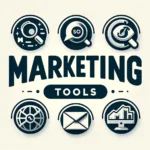 The Importance of Marketing Tools In today’s digital landscape, businesses …
The Importance of Marketing Tools In today’s digital landscape, businesses …Digital Marketing Tools: The Importance of Marketing Tools Read More »
- A Guide to Fundamental Marketing Tools for Businesses
 What are marketing tools? At Opvital, we’re dedicated to shedding …
What are marketing tools? At Opvital, we’re dedicated to shedding …A Guide to Fundamental Marketing Tools for Businesses Read More »
- The Significance of Marketing Tools
 Key Takeaways for Marketing Tools Marketing Tools Overview – Diverse …
Key Takeaways for Marketing Tools Marketing Tools Overview – Diverse … - A Comprehensive NeuronWriter Review: Unveiling Its SEO Powers
 Welcome to Opvital’s in depth NeuronWriter Review. NeuronWriter is more …
Welcome to Opvital’s in depth NeuronWriter Review. NeuronWriter is more …A Comprehensive NeuronWriter Review: Unveiling Its SEO Powers Read More »
